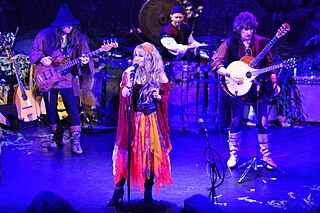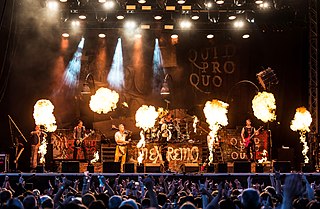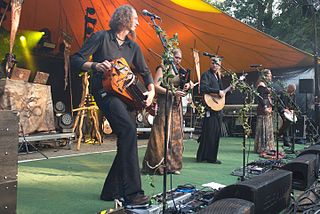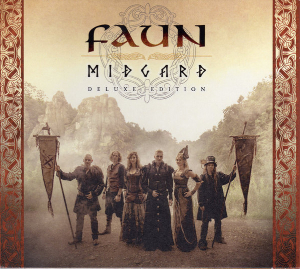Related Research Articles
Medieval metal is a subgenre of folk metal that blends heavy metal music with medieval folk music. Medieval metal is mostly restricted to Germany where it is known as Mittelalter-Metal or Mittelalter-Rock. The genre emerged from the middle of the 1990s with contributions from Subway to Sally, In Extremo and Schandmaul. The style is characterised by the prominent use of a wide variety of traditional folk and medieval instruments.

Blackmore's Night is a British-American neo-medieval folk rock band formed in 1997, consisting mainly of Ritchie Blackmore and Candice Night. Their lineup has seen many changes over the years; Blackmore and Night have been the only two constant members. They have released eleven studio albums. Their early releases were mostly acoustic and imitated early music, but eventually Blackmore's Night started using more electric guitars and other modern instruments, as well as performing folk-rearranged cover versions of pop and rock songs.

Stemming from Sweden, the nyckelharpa, meaning "keyed fiddle" or "key harp"(lit.), is a bowed chordophone, similar in appearance to a fiddle or violin but larger, which employs key-actuated tangents along the neck to change the pitch during play, much like a hurdy-gurdy. The keys slide under the strings, with the tangents set perpendicularly to the keys, reaching above the strings. Upon key-actuation, the tangent is pressed to meet the corresponding string, much like a fret, shortening its vibrating length to that point, changing the pitch of the string. It is primarily played underarm, suspended from the shoulder using a sling, with the bow in the overhanging arm.

In Extremo is a German Medieval metal band originating from Berlin. The band's musical style combines metal with Medieval traditional songs, blending the sound of the standard rock/metal instruments with historical instruments. Versions of well-known traditional/Medieval ballads make up the main part of their repertoire, but the band has written an increasing share of original material in recent years. Their own material is written in German, whilst the traditional songs and cover songs are in a variety of languages.

As Europe experienced a wave of roots revivals in the 1950s and 1960s, France found its regional culture reviving traditional music. Brittany, Limousin, Gascony, Corsica and Auvergne were among the regions that experienced a notable resurgence in the popularity of folk music. Traditional styles of music had survived most in remote areas, such as the island of Corsica and mountainous Auvergne, as well as the more nationalist lands of the Basques and Bretons.

A rauschpfeife is a capped conical reed musical instrument of the woodwind family, used in Europe in the 16th and 17th centuries. In common with the crumhorn and cornamuse, it is a wooden double-reed instrument with the reed enclosed in a windcap. The player blows into a slot in the top of the windcap to produce the sound.

The musette de cour or baroque musette is a musical instrument of the bagpipe family. Visually, the musette is characterised by the short, cylindrical shuttle-drone and the two chalumeaux. Both the chanters and the drones have a cylindrical bore and use a double reed, giving a quiet tone similar to the oboe. The instrument is blown by a bellows.
The Harp Consort is an international early music ensemble directed by Andrew Lawrence-King, specialising in Baroque opera, early dance-music, and historical World Music.

Faun is a German band that was formed in 1998 and plays pagan folk, darkwave, and medieval music. The originality of their music style is that it falls back to "old" instruments, and the singing is always the center of attention. The vocals are performed in a variety of languages, including German, English, Latin, Greek, and Scandinavian languages. Their instruments include Celtic harp, Swedish nyckelharpa, hurdy-gurdy, bagpipes, cittern, flutes, and many others.

Marco Ambrosini is an Italian musician, composer and arranger living in Germany.

Saltatio Mortis is a German medieval metal group. The Latin name means "dance of death". It is an allusion to the Danse Macabre, and a motto of the band is: "He who dances does not die."
Studio der frühen Musik was an early music group active from 1960–1980 and based in Munich.

Louis van Waefelghem was a Belgian violinist, violist and one of the greatest viola d'amore players of the 19th century. He also composed several works and made transcriptions for viola and viola d'amore.
The Texas Early Music Project is a performing arts ensemble based in Austin, Texas, that focuses on bringing audiences a closer knowledge and appreciation of Baroque music, Medieval music, Renaissance music, and early Classical-period music. The group uses historical instruments in keeping with historically informed performance practice. The ensemble was founded in 1987 by Daniel Johnson, who remains the group's artistic director. The group is classified as a non-profit organization and operates primarily on grant money and donations for individual and corporate supporters. Income is supplemented by ticket sales and merchandise sales. Texas Early Music Project is a member of Early Music America. Performers are primarily professional musicians from the Austin area, although performers visit from Texas at large, from all over the United States, and occasionally internationally.

Midgard is the ninth studio album by the German band Faun, released on 19 August 2016 via Electrola. It is the final album to feature Katja Moslehner before her departure in 2017.

Märchen & Mythen is the tenth studio album by German band Faun, released on 15 November 2019 through We Love Music, Electrola and Universal Music Group. It is the first full length studio album to feature member Laura Fella, and the last to feature founding member Fiona Frewert.